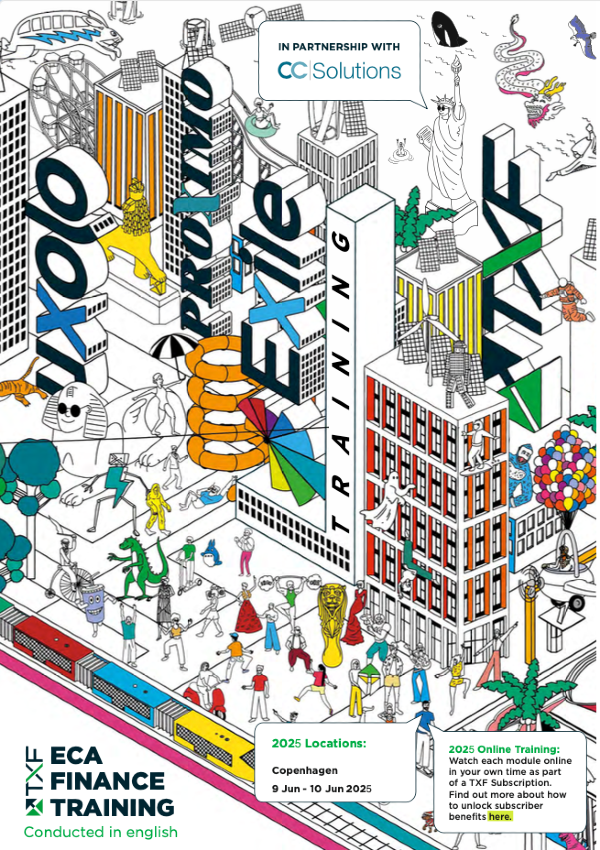Trade finance gets new rules for electronic payment obligations
The International Trade and Forfaiting Association (ITFA) has unveiled a new set of industry rules that cover the transfer of electronic payment obligations, which can be used to support the finance of international trade. ITFA outlines how the rules prepare the market for the practicalities of the digital world.

As the digitalisation of trade finance gathers pace, thanks in part to changes in legislation, digital instruments such as payment obligations are likely to continue to be created in a variety of forms – some electronic equivalents of existing instruments, others completely new and innovative.
ITFA’s Uniform Rules for Transferable Electronic Payment Obligations (URTEPO), launched in early December, ready the secondary market for the introduction of these new instruments, so that they may be transferred – repeatedly if necessary – through the various digital platforms and operating systems that are being developed across the industry.
With these rules, ITFA is providing industry participants with a framework that they can begin to incorporate into their transactions as the traditional forfaiting market becomes increasingly modernised.
Combined with ITFA’s work under the auspices of its Digital Negotiable Instruments Initiative (DNI Initiative), which counts the launch of the Electronic Payment Undertaking template wording and the dDOC specifications among its successes, ITFA now offers an end-to-end journey for trade-related financial instruments.
“New legislation is paving the way for innovation in the world of trade finance. The law is facilitative, it makes a whole lot of different approaches possible, but that’s not the end of the story – those new approaches need to be implemented,” says Sarah Green, commercial and common law commissioner for England and Wales.
“ITFA’s new rules provide a benchmark for the community for how to go about transferring the new digital instruments that many jurisdictions have started acknowledging as having the same legal standing as their paper-based counterparts. There’s a real symbiosis of legal and technical change and initiatives like this go a long way in creating certainty in the commercial sphere.”
Paul Coles, ITFA board member and chair of its Market Practice Committee, and Geoff Wynne, partner at Sullivan & Worcester, who led the ITFA working group that drafted the new rules, provide an overview of what the framework means in the context of the digital trade landscape.
What do these new rules cover, and why has ITFA produced them?
 Paul Coles (PC): The advent of new technology as well as legislative changes, including UNCITRAL’s Model Law on Electronic Transferable Records (MLETR) and the UK’s Electronic Trade Documents Bill, are driving new ways to create and transfer traditional trade instruments in digital form.
Paul Coles (PC): The advent of new technology as well as legislative changes, including UNCITRAL’s Model Law on Electronic Transferable Records (MLETR) and the UK’s Electronic Trade Documents Bill, are driving new ways to create and transfer traditional trade instruments in digital form.
The URTEPO, being a set of rules that cover the end-to-end transfer of electronic payment obligations, are an evolution of the Uniform Rules for Forfaiting (URF), which govern physical negotiable instruments and were produced by ITFA and the International Chamber of Commerce in 2013. Given the progress being made in the digitalisation of trade, it was a logical step for ITFA to now look at bringing these rules up to date in a digital context.
That being said, we’re aware that for many financial institutions, the switch to fully digital trade cannot happen overnight. So while the supporting documentation to an electronic transfer is likely to be a mix of data and physical documents, as long as the payment obligation itself is already in digital form then it can be transferred using the URTEPO. If the payment obligation exists in paper, then the URF will apply. The two sets of rules are separate.

Geoff Wynne (GW): Instead of simply amending the URF, we saw this as a golden opportunity to widen what we might do to reflect the new market of electronic payment obligations by drafting rules for the transfer of these obligations. Note that the rules do not detail the technical requirements for the creation of the payment obligation itself.
Are the rules contingent on any legislation or specific technology?
GW: The rules were written with a view to reflecting how MLETR might be adopted around the world and how the framework might interact with the UK’s Electronic Trade Documents Bill. They use the same terminology. But the rules can be used in a contract now, even in jurisdictions where these laws have not yet been adopted. As long as you have created an electronic payment obligation, you can transfer it by a contract incorporating these rules.
The rules are designed to be technology neutral. We recognise that as technology develops, and we potentially see the introduction of better negotiable instruments, rather than just payment obligations, then these rules will continue to work. In theory, they transcend what happens next.
PC: The rules are there to clarify parties’ roles and responsibilities, working in tandem with the legal system in each jurisdiction which dictates how the transfer of ownership of the instrument is tackled.
How does URTEPO differ from the Uniform Rules for Digital Trade Transactions (URDTT), launched in 2021?
GW: The URDTT provide an overarching framework for digital trade transactions. They serve to address uncertainty around how buyers and suppliers can reflect their underlying sale and purchase by electronic records, and how electronic data relating to digital trade transactions must match.
For example, if you had a transaction that is reflected by the URDTT, you can then transfer payment for that transaction using URTEPO. The URDTT provide a way of getting that electronic payment obligation, which can then be transferred. They sit together, they don't rival or contradict each other in any way. The drafting of the URTEPO had the URDTT in mind throughout but without specifically referencing it.
What are the major benefits of these new rules for industry participants?
PC: If they so wish, institutions can use the URTEPO to sell payment obligations in a different way – it opens up a new set of possibilities.
For example, traditionally, no one would consider transferring short term instruments. By the time you try and get the recognition of assignment for each and every invoice that's being transferred from one party to the other, the instrument is likely to have matured. The admin leading up to it would be a huge burden and you’d drown in paperwork.
Electronic instruments and the URTEPO can enable financial institutions to use a platform or electronic system to effect a transfer to the investor almost instantaneously if they agree on the data points.
It’s worth noting that the URTEPO can be used for both short term trade receivables and longer term payments under export contracts.
How will this initiative pave the way for future developments in digital trade?
PC: The digital trade ecosystem has many different components that all address various elements – and they all need to work together. There's never going to be one single set of rules that will capture everything end to end. The URTEPO are one of the components that ITFA identified as being an area where we can add value, given our involvement in producing the URF and our leading role in serving the needs of institutions involved in trade risk and asset origination and distribution.
The rules are part of the process of creating a new digital landscape – they facilitate a framework so that institutions can start thinking about and understanding their roles and responsibilities. They contribute towards greater clarity and aim to provide market players with more confidence about what will happen in the future if they choose to adopt the rules.





